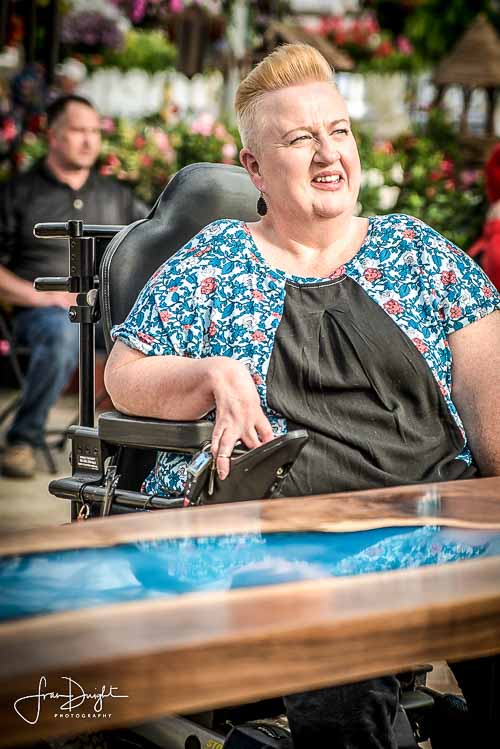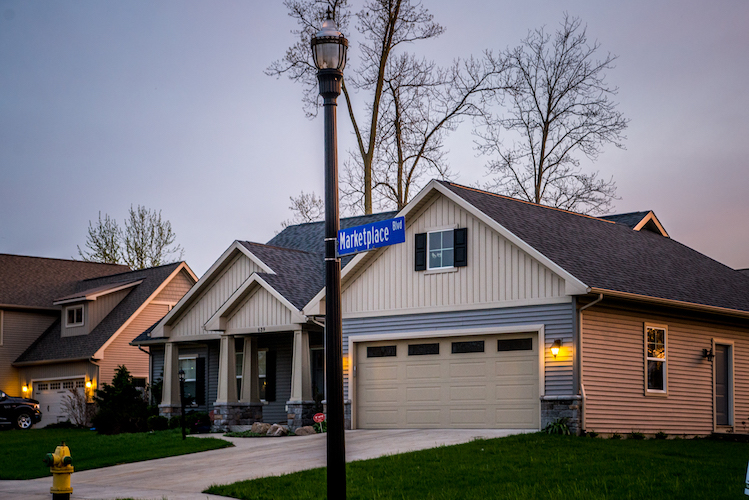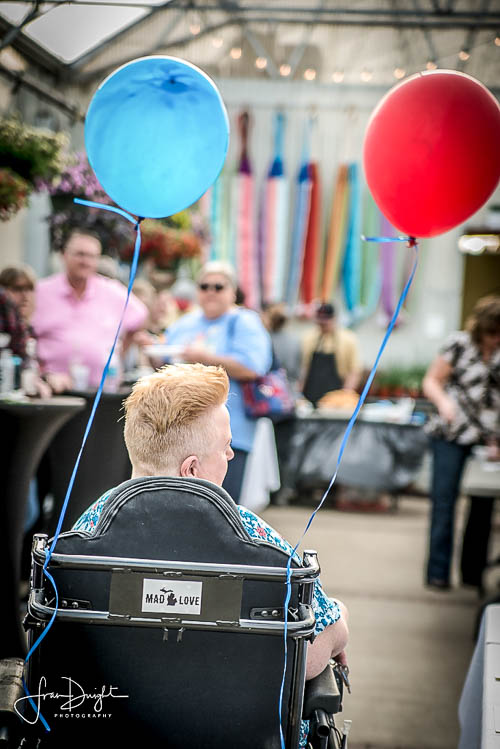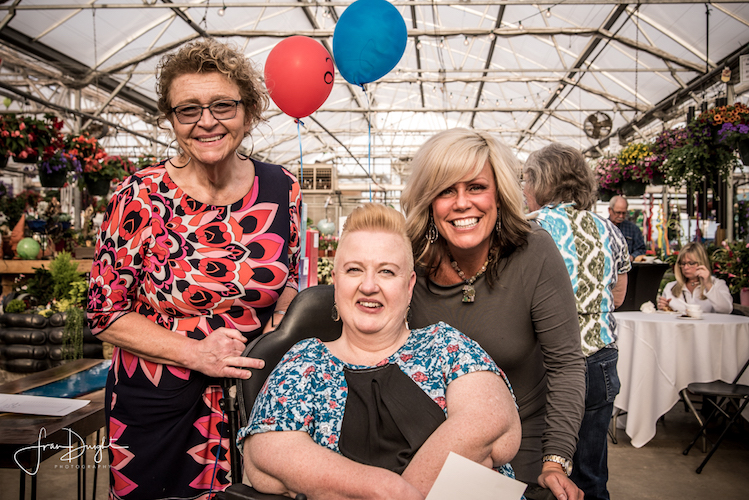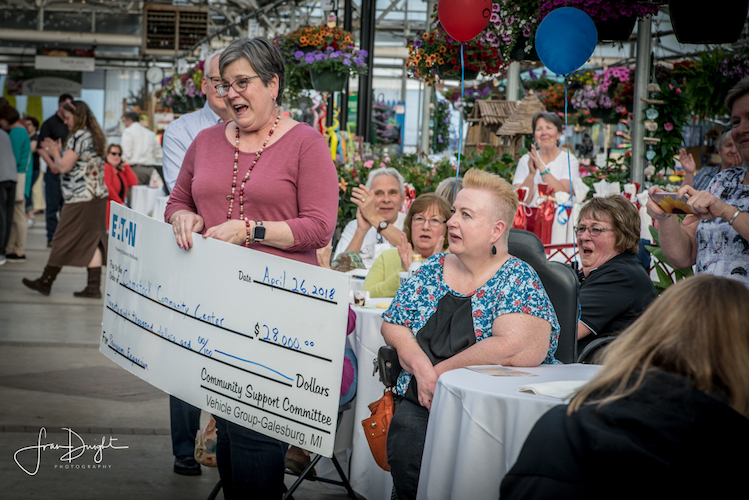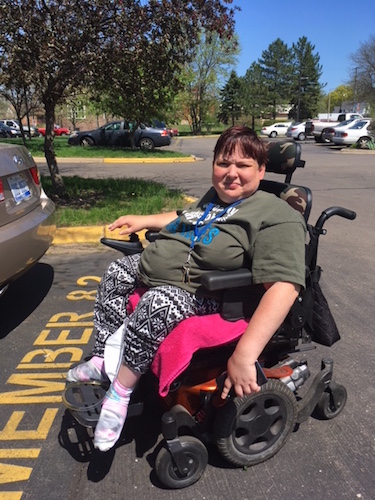Edison is disability friendly, but unfriendly sidewalks are among issues to be addressed
Affordable housing makes Edison a place where many with disabilities live. The neighborhood is both accommodating and in some places hazardous for those navigating broken sidewalks.
Getting your Trinity Audio player ready...
Editor’s note: This story is part of Southwest Michigan Second Wave’s On the Ground Edison series.When Pam Burpee moved from the west side of Kalamazoo to the Edison neighborhood five years ago, she was looking for a disability-accessible house with a convenient location, and also a home in which she could age in place.
Five years later, Burpee says she couldn’t be more pleased with her purchase. The home she found is located in The Marketplace, a plat of 24 attractive, Craftsman-style homes by the Kalamazoo County Land Bank and located near the Kalamazoo Farmers Market on Bank Street.
The Marketplace is a unique sliding-scale housing community, designed and built in a partnership involving the Home Builders Association of Greater Kalamazoo, the city of Kalamazoo, the Kalamazoo County Land Bank Authority, and select builders. One goal of the project was to have affordable, accessible housing that raises the pride of home ownership in the neighborhood.
New to the Edison neighborhood at the time, Burpee has since grown to love the area and has been involved in many local programs, including Building Blocks, a community-building and beautification program, and as a former board member of the Edison Neighborhood Association.
“Unfortunately, there’s always the rumors that Edison is a bad neighborhood, that there’s a lot of crime,” Burpee says. “But when I moved in here, I was greeted by neighbors on the Portage Court area who basically welcomed me with open arms and said, ‘we know you live here by yourself, but if you ever need anyone, we’re only a phone call away.’”
In the grand scheme of Edison and Kalamazoo, an agreed-upon goal is to make city neighborhoods liveable for all—this includes the concept of complete streets, which are designed for cars, bikes, pedestrians, as well as the disabled, and universal design, which includes building and modification to new or existing housing for greater accessibility so residents can age in place.
In some regards, Edison has been ahead of the curve with the improvements to disability access, such as additions to Upjohn Park in terms of paths and playground structure and Reed Park with trails. Edison also has walkability to many services, such as health clinics and a grocery store. Even so, many disabled and elderly, as well as their advocates agree, improvements can still be made, especially in terms of sidewalk repair, cut curbs, and renovations to the older homes in the neighborhood to make them accessible for the disabled.
Edison, with its high concentration of those in poverty, has a high proportion of disabled and senior residents, according to Tammy Taylor, Director of the Edison Neighborhood Association. Taylor says more needs to be done in the neighborhood to ensure that residents have safe pathways that include cut curbs and functional, repaired sidewalks.
Taylor, who has had two hip replacements over the last few years, says she feels compassion for those who have to navigate broken and missing sidewalks, and she is a huge advocate for disability accessibility in the neighborhood.
“There are places in the neighborhood where the sidewalk just stops, and if you are going along in a wheelchair, you have to back up three blocks and turn around,” Taylor says. “If you are in a manual wheelchair, that’s a lot of work.”
For those in wheelchairs or scooters, or those with walkers or canes, or any other issue that impacts mobility, including simply age, pathways that are clear and in good repair are not only for convenience, they are for safety.
Taylor would also like to see the potholes filled and fixed. “There is a huge pothole on Portage Street and Washington Square and we have had to go out and literally help people in wheelchairs who have become stuck,” she says.
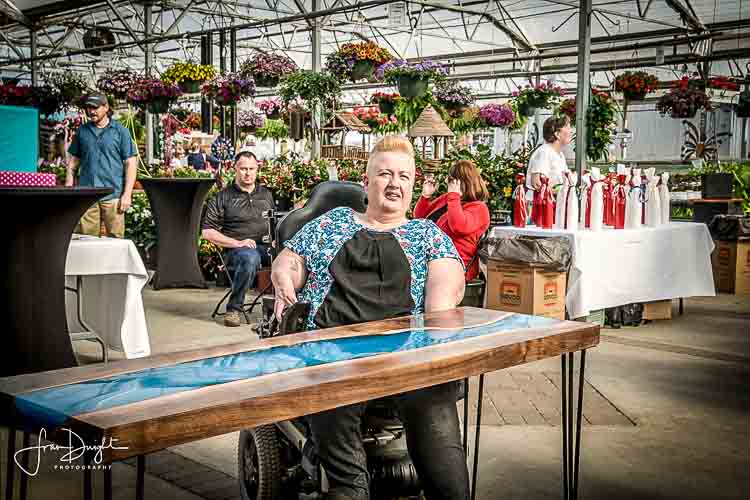
Because of unshoveled winter sidewalks or broken up cement, disabled residents frequently take to the streets. “That’s why we begged for a bike lane on Portage Street,” Taylor says. “In the winter, they run their wheelchairs right down Portage, so at least now, they are a little, little safer.”
Lisa Persons, a resident of Washington Square Senior Co-op Apartments who uses an electric wheelchair, agrees. Persons, due to her health issues, says she frequently has six to eight doctor’s appointments a month and can’t always afford Metro Transit. “As far as sidewalks, I literally sometimes have to go around and out into the road if there’s a bad place, and that’s a danger for people like me.”
While Metro Transit is available in the neighborhood, for those on fixed incomes, the cost can be prohibitive.
“It’s very expensive to be poor,” says Paul Ecklund, American Disabilities Act Advocate Specialist and Systems Advocate at Disability Network Southwest Michigan (DNSM), citing transportation as a major expense.
Ecklund credits Metro Transit for moving toward improvements that will help those with disabilities. “We’re really advocating for a fully-accessible fixed stop system,” he says. Fixed stops instead of stops on demand help ensure the presence of concrete pads so that people with mobility issues don’t have to cross grass or mud, potentially getting stuck.
“Edison does have pretty good access to the transit system,” says Ecklund. “It’s not perfect, but it’s getting better. There’s a grocery store people can get to. There are health clinics and an accessible park (Upjohn Park). Those are all positive things in the neighborhood.”
Ecklund credits the city with being progressive, as well, in considering how to move towards creating complete streets when doing repairs. “Creating complete streets means changing habits,” he says. “There is a lot of movement towards making things disability-friendly.”
As a fan of Edison, Burpee would like to see all the accessibility improvements mentioned by others come to pass. “My number one concern is accessibility and sidewalk safety,” says Burpee, who recently assumed a position as Advocacy Coordinator at Disability Network Southwest Michigan where she has also in the past served on the board. Her new job happens to be in the neighborhood, as well.
While acknowledging there’s always room for improvement, Burpee says she also appreciates the convenience in Edison that already exists.
When going out, Burpee says she usually takes a path that is less-traveled by cars. For safety purposes, she knows the neighborhood routes in terms of sidewalks, which means sometimes she must go out of her way a few blocks.
“I absolutely love this area,” says Burpee of Edison. “I love the accessibility of the downtown area. I do drive a car. I’m a power wheelchair user. But on beautiful days like today, I can wheel wherever I want to wheel.”
When first moving to Edison, Burpee visited the Family Dollar near her home to see what supplies were available and then headed to the coffee shop at Bronson Hospital two miles away. “They have fabulous coffee and I’m a coffee junky,” she says.
Undaunted by long commutes, Burpee routinely travels downtown by chair (strolling or walking, she calls it) and hits the restaurants, Bronson Park, or the festivals at Arcadia Creek.
Right outside her door, however, is the greatest destination of all, what she calls “a little party every Saturday morning,” the Farmers Market, visible from her street.
“There is truly nothing better than having the farmers market in your backyard,” says Burpee.
On Saturdays, Burpee says she buys her groceries, takes them home, puts them away, and then often goes back to the market again. “I will get a bite to eat from one of the food trucks, get a coffee, run into friends, listen to music. At the night market, I love going down there in the evening, having an adult beverage, and meeting up with friends.”
For Burpee, who was born with arthrogryposis multiplex congenita, a rare disorder that affects the flexibility of the joints and limbs, as well as muscle tone, the reality of needing permanent home health care in the future is undeniable. So the issues of aging in place were prominent when she chose her home.
“We’re all going to need accessible housing some time if we want to stay in our homes,” says Lewis Whalen, Program Director at Disability Network Southwest Michigan.
Currently, State Senate Bill 184, the Accessible Housing Act, if passed, will allow tax credits for upgrading housing to make existing homes more accessible, points out Ecklund. These changes would make living for the aging or disabled population more affordable, Ecklund says. “Most people would rather be at home than in a nursing home.”
“Kalamazoo suffers from the fact that it’s an older community,” Whalen says. “It’s a suburban set-up where you drive to your services downtown or at the mall. What we are aiming for is these walkable communities, dispersing these things, and Edison is moving toward that.
“The needs of people with disabilities in the community are very much the same as everyone else in the community, but the level of need is just much higher,” says Whalen.
“Everyone benefits from accessibility,” Ecklund adds. “If you make things accessible, you will be able to enjoy it when you grow older.”
Burpee hopes to grow old in Edison. Whenever the time comes that she needs more than two hours of assistance a day from healthcare providers, she knows she has a separate bedroom and bathroom for live-in help. And she has great neighbors.
“I think the people of this neighborhood are really good at taking care of each other, but we need to dispel the stereotypes about Edison that it’s not safe and is scary,” Burpee says. “The people are wonderful, and good things are happening,” she says, citing recent improvements on Portage Street, such as Pho on the Block, Jersey Giants Subs, and the Community Promise Credit Union.
“We just have to keep the motivation going. To do so, we absolutely have to allow the people of Edison to help make those decisions and be a part of the process. It doesn’t always work when you have someone from outside Edison come in and say this is what’s wrong with your neighborhood and that’s how you want to fix it.”
Disabled and elderly people can tell you what they need in terms of improvement and assistance, all agree. And their voices are important as changes and improvements to the neighborhood are considered.
“We need to listen to the voices of this neighborhood on how we can improve things,” Burpee says, “and make it inviting so that other people can come into our neighborhood, spend their money, and we can keep rising up.”
Theresa Coty O’Neil is a Kalamazoo area freelance writer. Her articles have appeared in many local publications and her short stories have been published in Alaska Quarterly Review and West Branch, among others. She is the Project Editor for On the Ground Edison.
Southwest Michigan Second Wave’s “On the Ground Edison” series amplifies the voices of Edison Neighborhood residents. Over three months, Second Wave journalists will be embedded in the Edison Neighborhood to explore topics of importance to residents, business owners, and other members of the community. To reach the editor of this series, Theresa Coty-O’Neil, please email her here or contact Second Wave managing editor Kathy Jennings here.
The On the Ground program is made possible by funding from the City of Kalamazoo, LISC, the Fetzer Institute, the Irving S. Gilmore Foundation, United Way of the Battle Creek and Kalamazoo Region, Michigan WORKS!, the Kalamazoo Community Foundation and the Arts Council of Greater Kalamazoo.
For more Edison coverage, please follow these links.
Empowering Women in Edison: Two women who help others find their own strengths
The library building is in its 90th year, but the programs change to keep up with Edison
For many single parents in Edison it takes almost super powers to succeed
Let your voice be heard in Edison: IK2025
From a single scooter company to three buildings, Jericho Town grows in Edison
Liga Azteca de Futbol offers convenient sports option for Edison parents
Fire: Where teens find a safe place to learn about themselves and others with poetry
Edison: Where helping your neighbor is what people do and diversity is a matter of pride
Edison Voices: Geno Hinton in his own words
On the Ground Kalamazoo launches in the Edison Neighborhood

